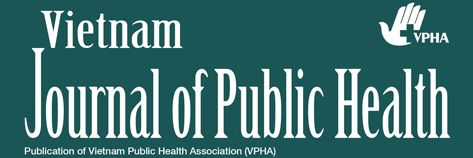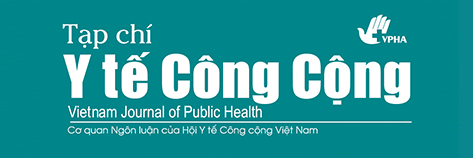Thực trạng lập kế hoạch học tập trong sinh viên đại học Y Hà Nội và một số yếu tố ảnh hưởng (Study planning and its determinants among students in Hanoi Medical University)
Tóm tắt
Mục tiêu: Mô tả thực trạng lập kế hoạch học tập (LKHHT), kiến thức, thái độ và khả năng LKHHT của SV ĐHYHN năm 2009- 2010 và một số yếu tố ảnh hưởng. Phương pháp: nghiên cứu mô tả cắt ngang sử dụng phương pháp định lượng (bộ câu hỏi tự điền có hướng dẫn) trên 421 SV đa khoa ĐHYHN. Kết quả: Tỷ lệ chung SV có hành vi LKHHT khá cao, tuy nhiên tỷ lệ thường xuyên LKHHT trong năm học vừa qua và năm học hiện tại thấp, nhưng có xu hướng tăng dần, cao nhất ở Y6. Tỷ lệ SV thực hiện đầy đủ 4 kỹ năng LKHHT thấp (~25%). Tỷ lệ SV có kiến thức chung về LKHHT cao (~96%), tuy nhiên tỷ lệ trả lời đúng cả 8 câu hỏi thấp (<23%). Tỷ lệ chung SV có thái độ tích cực với hành vi LKHHT (~98%). Tuy nhiên vẫn có tới 34% SV cho rằng “Nếu bạn đã học tốt các môn thì không cần phải lập kế hoạch”. Khả năng (Tự nhận thức) của SV dường như không song hành với kiến thức và thái độ tốt của họ. 2 yếu tố kiến thức và khả năng LKHHT có liên quan đến hành vi LKHHT, tuy nhiên thái độ liên quan không có ý nghĩa thống kê với hành vi LKHHT. Khuyến nghị: có những hoạt động định hướng nhằm trợ giúp SV thực hành LKHHT có hiệu quả.- tổ chức các khóa học định hướng , các hội thảo chuyên đề về phương pháp học tập và LKHHT cho SV, đặc biệt là SV năm đầu khi họ mới vào trường. Ngoài nâng cao kiến thức và tăng cường thái độ tích cực, cần củng cố kỹ năng và khả năng của SV thông qua các cơ hội thực hành LKHHT. Có các nghiên cứu can thiệp để khẳng định vai trò của thái độ đối với hành vi LKHHT- cần kết hợp hỏi và quan sát các kế hoạch học tập của SV (bản ghi, bản kế hoạch, lịch thời gian…) để kết quả chính xác hơn.
English abstract
Objective: To describe a status, knowledge, attitude, self-efficacy and determinants about study planning among students of Hanoi Medical University (HMU) during 2009-2010 period. Methodology: a cross-sectional study using quantitative approach (self-administered questionnaire with a careful guide) to 421HMU students. Results: the overall proportion of students having study planning behavior is relatively high. However, the proportion having frequent study planning during the past year and the current year is modest, and it tends to increase across academic years (highest in the 6th year). The proportion of practicing altogether 4 planning skills is low (~25%). The overall proportion of students having knowledge on study planning is high (~96%), but the proportion having correct responses to all 8 items of knowledge is less than 23%. The overall proportion with positive attitudes is also high (~98%); however, up to 34% stated that "if a student studied well all the past topics, it would not be necessary to make any planning for study". Students' self-efficacy appears not in parallel with their knowledge and attitude level. Two factors - knowledge and self-efficacy are associated with study planning behavior, whilst attitude is not. Recommendations: it is necessary to arrange orientation activities to support students in practicing study planning - orientation short courses and seminars on study methods and planning, especially when students just enter the first academic year of HMU. Apart from improving knowledge and positive attitudes, it is important to enhance students' self-efficacy through arranged opportunities for students to practice study planning. Further research using intervention design is needed to help confirm the role of attitude related to study planning behavior - combining questions and observations on study plan notes of students such as study notes, time table, study schedule, timeline notes, etc. in order to achieve research results of higher accuracy.
Từ khóa
Toàn văn:
PDF (English)##submission.citations##
Tài liệu tiếng Việt
Nguyễn Duy Luật & CS (2006). Giáo trình Tổ chức Y tế, Trường Đại học Y Hà Nội, tr. 138
Nguyễn Văn Huy & Đào Thị Minh An (2008). Hút thuốc lá trong SV Đại học Y Huế: Thực trạng và một số yếu tố liên quan, Tạp chí Nghiên cứu Y học, tập 54, số 2, tr. 107-113.
Nguyễn Văn Huy & Đào Thị Minh An (2008). Hút thuốc lá trong SV Đại học Y Hà Nội: Thực trạng và một số yếu tố ảnh hưởng, Tạp chí Nghiên cứu Y học, tập 53, số 1, tr. 114- 121.
Phan Văn Mai (2004). Nghiên cứu hút thuốc lá trong SV Y khoa Đại học Y Dược Cần Thơ năm 2004, Luận văn thạc sỹ y tế công cộng, tr. 71 - 72.
Phòng công tác học sinh sinh viên (2009). Báo cáo số lượng sinh viên Đại Học Y Hà Nội năm học 2009-2010 (tra cứu 5/9/2009) của phòng công tác học sinh SV- Trường Đại Học Y Hà Nội.
Tài liệu tiếng Anh
Barrows, H. S. & Tamblyn, R.M. (2002). An evaluation of PBL in small group ultilizing a simulated patient. Journal of Medical Education. 51: 1-9.
Barry J.Z. & Dale H.S. (2001). Self- evaluated learning and academic achievement: theoretical prospectives. Lawrence Erlbaunm Associate.
Billie, E. & Irit, A. (2003). Students' planning in the process of self-evaluated learning. Contemporary Educational Psychology, 21 (3): 304-334.
Boekaerts, M. (1997). Leiden University, Centre for Study of Education & Instruction. 7(2): 161-186.
Kalyani, C. & Chang, C.H. (1999). Problem based learning within traditional university geography course - a learning experience. Nanyang Technological University, Singapore.
Keeves, J. P. (2004). Lesson 12: Practical and Statistical Significance (material of the course in Introduction to Statistics and Data Processing). Flinders University, Australia: Department of Education.
Norman, G.R. & Schidmit, H.G. (1992). The psychological basis of problem-based learning: a review of the evidence. Academic Medicine. 67(9).
Rosenstock, I. M. (1974). Historical origins of the health belief model. Health Education Monograph. 2: 328-335.
Shearer, C. (2009). Exploring the relationship between intrapersonal intelligence and university students' career confusion: implications for counseling, academic success, and school-to-career transition". Journal of Employment Counseling. 46(2): 52-61.
US Fed News Service (2007). Next phase of academic planning at University of Wyoming Unveiled. Academic Research Library, Washington, D.C.
Website wikipedia.com (tra cứu 25/5/2010).
Website Trường Đại học Virginia Tech, bang Virginia, USA www.ucc.vt.edu (tra cứu 1/3/2010).



